The views expressed in our content reflect individual perspectives and do not represent the authoritative views of the Baha'i Faith.
Theocracy – thee-ok-ruh-see: a form of government in which God is recognized as the supreme civil ruler, with God’s laws being interpreted by the ecclesiastical authorities.
A few weeks ago, a website called Common Ground re-ran one of our BahaiTeachings.org series, and a reader asked “Is the Baha’i Faith a theocracy?”
His concern, expressed in a series of comments, centered around the way the Baha’i Faith emerged historically from its Islamic origins. Several of his questions also arose out of the commonly-held, but mistaken Western belief that all Moslem societies have theocratic governments. He asked “In the future, when the Baha’i Faith expands even more than it has already, will it take over the reins of government – and what kind of government would Baha’is build?” He also asked “What about Baha’i laws? Would they be applied to everyone in a predominately Baha’i society?”
This series of articles will attempt to answer his insightful and important questions.
But before we delve into the questions and hopefully find some answers, I would offer a disclaimer – there are no experts on these matters. I’m just one Baha’i, and these are only my humble opinions about the Baha’i teachings. The Baha’i Faith has no clergy, and all of its administrative leadership is democratically-elected, which means there are no “Baha’i experts” or individuals with any authority over other Baha’is. So I encourage you to investigate this complex subject and form your own opinions.
If you’ve been reading BahaiTeachings.org for a while, you already know that the Baha’i Faith, according to the reference text The World’s Religions in Figures, “is the only religion to have grown faster in every United Nations region over the past 100 years than the general population; Baha’i was thus the fastest-growing religion between 1910 and 2010, growing at least twice as fast as the population of almost every UN region.”
Despite that growth, Baha’is still only represent a small fraction of the total global population, with estimates ranging somewhere between 5-8 million adherents worldwide – maybe a tenth of a percent of humanity. But with continued expansion – which has certainly occurred with past world religions at comparable stages in their development — those numbers could rise fairly rapidly. Given such a future possibility, the questions about the Baha’i Faith and its governing philosophy and style begin to take on a new importance. But let’s explore some basic background before we try and answer them.
First of all, the Baha’i Faith bases all of its principles and laws on the teachings of Baha’u’llah, its prophet-founder. Baha’is, as the name suggests, are followers of Baha’u’llah, and adhere to the spiritual guidance he taught. Baha’u’llah wrote more than a hundred volumes, including a major book of laws called the Kitab-i-Aqdas (The Most Holy Book) and many others — the Book of Certitude. The Hidden Words, the Seven Valleys, etc., etc. The Baha’i Faith has no shortage of authoritative guidance from its founder.
Second, when Baha’u’llah passed away in 1892, he left a detailed will, a covenant that very clearly spelled out who his successor would be – his oldest son Abdu’l-Baha, who he named the Center of the Covenant and the Exemplar of the Baha’i teachings. Abdu’l-Baha wisely guided the development of the Baha’is and their Faith for the next 29 years, until his death in 1921.
Third, when Abdu’l-Baha passed away, he left a Will and Testament that clearly extended the provisions of the Baha’i Covenant, and the leadership of the Baha’i Faith, to his grandson, Shoghi Effendi. Abdu’l-Baha appointed him as the Guardian, a title that reflected Shoghi Effendi’s authority to guide the Baha’is, guard the Faith from factionalism, and interpret Baha’u’llah’s and Abdu’l-Baha’s writings.
This succession of leadership, which altogether spanned almost a hundred years of continuous, uninterrupted and authoritative direction and guidance (1863-1957), effectively prevented the Baha’i Faith from developing the major, disunifying schisms, splits and sectarianism that have plagued other world religions after the passing of their founders. Today the democratically-elected Universal House of Justice protects the unity of the Faith and guides the Baha’is around the world. In a few decades the Baha’i Faith will be 200 years old, and in all that time it has retained its essential unity.
The unbroken Baha’i line of successive guidance also had other positive effects. Chiefly, it prevented the development of a binding body of non-scriptural, second- and third-hand hearsay “traditions,” contributing to an unprecedented level of clarity and precision in Baha’i laws — especially when it comes to the subject of politics and government.
Baha’u’llah set the tone, spirit and substance of the Baha’i view of political involvement when he addressed the kings and rulers of the world, saying:
By the righteousness of God! It is not Our wish to lay hands on your kingdoms. Our mission is to seize and possess the hearts of men. Upon them the eyes of Baha are fastened. To this testifieth the Kingdom of Names, could ye but comprehend it. – Baha’u’llah, The Kitab-i-Aqdas, pp. 49-50.
None must contend with those who wield authority over the people; leave unto them that which is theirs, and direct your attention to men’s hearts. – Baha’u’llah, The Kitab-i-Aqdas, p. 54.
This powerful theme – that religion’s purview, the human heart, should remain apart from the realm of politics and temporal authority – is just one of the many instances throughout the Baha’i teachings that separates religious law from the social and political systems it serves.


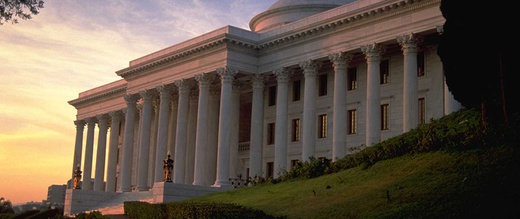

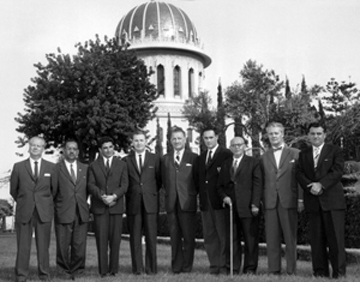




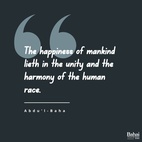
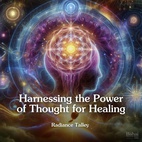

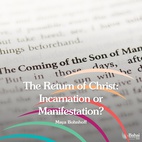





Comments
Sign in or create an account
Continue with Facebookor